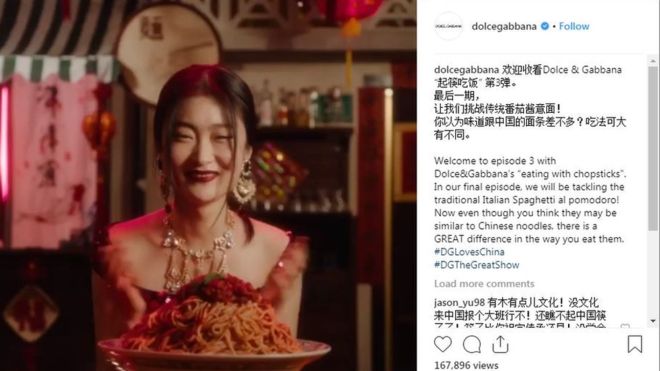“One of the biggest disasters in the fashion industry” sounds melodramatic if you haven’t heard about the racism scandal engulfing Dolce & Gabanna. The title is, unfortunately, well-deserved. The Chinese state media newspaper The Global Times used it to describe the recent events surrounding Dolce & Gabbana’s advertisement of their upcoming (now cancelled) Chinese spectacular and subsequent events.
“The Great Show”, supposed to be Dolce & Gabbana’s biggest show in its 33 years, was to occur on the 21st November in Shanghai. Supposed to be an opulent love letter to China and its people, the show was meant to feature 300 looks, 400 performers and an hour-long ode to China, in front of an audience of 1,400 of China’s most prominent socialites.
All this excess was presumably because China is a captive audience for design houses like Dolce & Gabbana. 36% of global luxury good sales can be accounted for by the Chinese. To say the potential for Dolce & Gabanna to make huge profit margins from the Great Show is an understatement.
The show has been cancelled after its disastrous Chinese advert designed to raise awareness of the brand leading up to the Show. The advert, released on the 17th of November, depicted a Chinese woman attempting to eat a pizza with a pair of chopsticks and struggling. The voiceover speaks patronisingly to the actor, saying things like “don’t try to use your chopsticks like knives” while stereotypical Chinese music plays. The final blow is the voiceover incorrectly pronouncing the brand’s name which has been widely interpreted as mocking the pronunciation of the brand name by Chinese speakers. Horrified response came immediately. Thousands complained how the ad degraded Chinese culture to a joke with stereotype after stereotype. With the furore came the hashtag #BoycottDolce and demands for an apology in both Chinese and English from the brand.
This, unfortunately, wasn’t the low-point of the scandal. The subsequent events we re truly Dolce & Gabbana’s digging of its own grave. It feels like common sense would be to, after quietly removing the advert, quickly issue the much-needed apology. Instead of issuing the apology Stefano Gabbana’s verified Instagram account had a violent disagreement in private messages with an Instagram user in which he made wildly racist statements about Chinese people.
In the screenshots posted by @dietprada, Gabbana is seen as writing that in interviews he plans on saying “the country of [poop emojis] is China” and “China ignorant dirty smelly mafia”
 More than just a tone-deaf and deeply ignorant advert, Gabbana’s direct messages illustrate how the advert is a manifestation of the internalised racism in the brand which goes all the way to the top.
More than just a tone-deaf and deeply ignorant advert, Gabbana’s direct messages illustrate how the advert is a manifestation of the internalised racism in the brand which goes all the way to the top.
The brand has since offered an apology video featuring Domenico Dolce and Stefano Gabbana personally apologising to the camera. Stefano Gabbana says they “will never forget the experience and the lessons learned this time, and this kind of incident will never happen again.” Too little, too late; Kaola, a Chinese e-commerce, removed its Dolce & Gabbana products; Secoo, a luxury goods retailer, removed listings of the brand from its site; Yoox Net-a-Porter said Dolce & Gabbana products were no longer available on its Chinese platforms.
Amongst all the peaks and troughs of the scandal, there’s something to say for the case for representation. Here lies the object principle of why representation matters: if a person of Chinese descent, or even of any non-western culture, had been involved in the process of creating and executing the advert, maybe it could have been less offbeat, and Dolce & Gabbana’s ideology could have included the notion that other cultures aren’t inferior to their own.
Georgie Wardall
Image: BBC
@diet_prada

